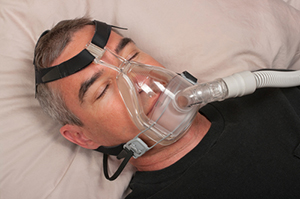 The quality of your sleep influences your health as much as the quantity, and there is one sleep pattern that has a terrible effect on your cardiovascular system.
The quality of your sleep influences your health as much as the quantity, and there is one sleep pattern that has a terrible effect on your cardiovascular system.
Sadly, most people who suffer from this are unaware of it.
And most seriously, just one night of this sleep pattern can spike your blood pressure.
Repeated studies have proven that people who suffer from sleep apnea are more likely to have high blood pressure than the rest of the population, but currently little is known about how this occurs.
Professor Glen Foster and his colleagues at the University of British Columbia have now published a study in the American Journal of Physiology that sheds some new light on this link.
They recruited 10 healthy volunteers (not suffering sleep apnea) to sleep in their laboratory during the night. They fitted the volunteers with ventilating masks to control their breathing.
Sleep apnea is a condition that causes your breathing to stop and start throughout the night, so to simulate this, they turned the participants’ oxygen levels up and down while they were sleeping.
The physiological consequences of just one night’s interrupted breathing were astonishing.
It crippled the function of their volunteers’ baroreceptors, which are the body’s sensors that regulate blood pressure.
As a result, just six hours of sleeping with sleep apnea spikes your blood pressure.
The scientists also found that it caused abnormal blood flow patterns in their subjects’ legs, probably because, during the periods of oxygen starvation, their bodies reserved most of the oxygen rich blood for their brains to keep them alive.
These abnormal blood flow patterns can lead to serious cardiovascular problems over time.
If you experience any of the symptoms of sleep apnea, such as waking up tired, loud snoring, or waking up gasping for air, you should go for a sleep test.
You can cure snoring and sleep apnea using the simple stop snoring exercises found here…

 Multiple Sclerosis
Multiple Sclerosis Banishing Bronchitis
Banishing Bronchitis Gum Disease Gone
Gum Disease Gone Overcoming Onychomycosis
Overcoming Onychomycosis Neuropathy No More
Neuropathy No More The Prostate Protocol
The Prostate Protocol Brain Booster
Brain Booster
 Ironbound
Ironbound
 Solution for Shingles
Solution for Shingles
 The Bone Density Solution
The Bone Density Solution
 The Ultimate Healing Protocol
The Ultimate Healing Protocol
 The Parkinson's Protocol
The Parkinson's Protocol
 The Chronic Kidney Disease Solution
The Chronic Kidney Disease Solution
 Overthrowing Anxiety
Overthrowing Anxiety The Fatty Liver Solution
The Fatty Liver Solution The Hypothyroidism Solution
The Hypothyroidism Solution
 The End of Gout
The End of Gout The Blood Pressure Program
The Blood Pressure Program
 The Oxigized Cholesterol Strategy
The Oxigized Cholesterol Strategy
 Stop Snoring And Sleep Apnea Program
Stop Snoring And Sleep Apnea Program
 The Arthritis Strategy
The Arthritis Strategy The Vertigo & Dizziness Program
The Vertigo & Dizziness Program The 3-Step Diabetes Strategy
The 3-Step Diabetes Strategy Hemorrhoids Healing Protocol
Hemorrhoids Healing Protocol The Erectile Dysfunction Master
The Erectile Dysfunction Master Weight Loss Breeze
Weight Loss Breeze The IBS Program
The IBS Program The Insomnia Program
The Insomnia Program The Migraine and Headache Program
The Migraine and Headache Program The Neck Pain Solution
The Neck Pain Solution The Menopause Solution
The Menopause Solution The Ejaculation Master
The Ejaculation Master The TMJ Solution
The TMJ Solution The Acid Reflux Solution
The Acid Reflux Solution The Fibromyalgia Solution
The Fibromyalgia Solution The Psoriasis Strategy
The Psoriasis Strategy